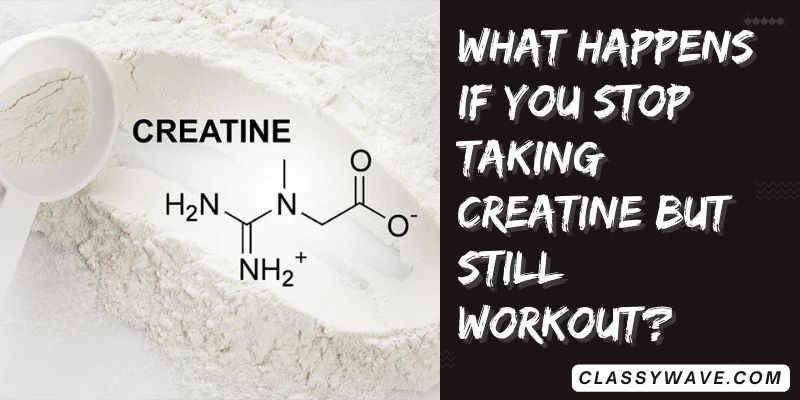What happens if you stop taking creatine but still workout?
Exploring the aftermath of ceasing creatine supplementation while maintaining a workout routine unveils multifaceted effects on exercise performance, muscle dynamics, energy levels, and overall fitness. This comprehensive overview delves into the intricacies of each facet, offering insights into adapting training strategies, nutritional considerations, and the psychological nuances involved.
Exercise Performance without Creatine
When you stop taking creatine but continue to work out, you may notice changes in exercise performance. Creatine is known for enhancing strength, power, and overall athletic performance. Without it, your muscles might experience a decline in immediate energy availability during high-intensity activities, potentially affecting performance. Understanding how your body adapts post-creatine cessation is crucial for optimizing training strategies and managing expectations.
Muscle Changes Post-Creatine
Ceasing creatine supplementation may influence muscle physiology. Creatine is involved in cellular energy production, and its absence could impact muscle water content and cell volume. Consequently, you might observe alterations in muscle appearance and potentially experience shifts in overall muscle function. Recognizing these changes is essential for adjusting workout routines and maintaining awareness of how muscle dynamics evolve without creatine support.
Energy Levels After Stopping Creatine
Creatine plays a vital role in the rapid regeneration of ATP, the body’s primary energy currency. Without creatine supplementation, your energy levels during high-intensity workouts may decrease. This could affect your ability to sustain peak performance and recover between sets. Adapting to this shift in energy dynamics requires adjustments in training intensity and volume, as well as considering alternative nutritional strategies to support energy demands during exercise.
Strength Gains sans Creatine
Creatine is renowned for promoting strength gains by aiding in quick energy release. When you discontinue creatine use, the rate of ATP replenishment may slow down, potentially impacting strength development. Understanding how your body responds to strength training without creatine is crucial for refining workout programs, setting realistic strength goals, and optimizing nutritional strategies to support ongoing strength gains.
Body Composition Post-Creatine
Creatine supplementation can lead to temporary water retention in muscles, influencing body composition. Upon discontinuation, you may experience a decrease in water weight, affecting your perceived muscle fullness and overall body composition. Managing expectations regarding these changes is important for those tracking body composition metrics and adapting nutritional and training strategies accordingly.
Training Adaptations sans Creatine
Stopping creatine requires adapting to changes in cellular energy dynamics. This shift may necessitate modifications in training volume, intensity, and recovery strategies to optimize performance. Understanding how your body adapts post-creatine cessation is crucial for developing effective training plans that align with your fitness goals. Integrating alternative strategies for enhancing energy availability and recovery becomes paramount in the absence of creatine support.
Reintroducing Creatine: Performance Impact
If you choose to reintroduce creatine after a period of cessation, understanding its impact on performance is crucial. Creatine repletion can lead to rapid improvements in strength, power, and exercise capacity. However, individual responses may vary. Monitoring performance changes upon reintroduction allows for tailored adjustments to training programs and highlights the importance of personalized approaches when incorporating or discontinuing creatine supplementation.
Research on Creatine Withdrawal and Exercise
Scientific studies provide valuable insights into the effects of creatine withdrawal on exercise performance. Research explores the temporal aspects of performance changes, alterations in muscle physiology, and the potential influence on strength gains. Understanding the findings from these studies helps individuals make informed decisions about creatine use, training adjustments, and overall fitness strategies. Staying informed about the latest research ensures a comprehensive understanding of the relationship between creatine withdrawal and exercise outcomes.
Exploring the aftermath of ceasing creatine supplementation while maintaining a workout routine unveils multifaceted effects on exercise performance, muscle dynamics, energy levels, and overall fitness. This comprehensive overview delves into the intricacies of each facet, offering insights into adapting training strategies, nutritional considerations, and the psychological nuances involved.
Nutritional Considerations After Creatine Cessation
Without creatine supplementation, attention to dietary factors becomes crucial. Ensuring an adequate supply of nutrients that support energy metabolism and muscle function is essential for maintaining performance and optimizing training adaptations. Exploring dietary adjustments post-creatine cessation contributes to a comprehensive approach in sustaining a balanced nutritional foundation for exercise.
Cognitive Effects of Creatine Discontinuation
Creatine’s role extends beyond the muscles, with potential cognitive benefits. Stopping creatine may influence cognitive function during intense physical exertion or demanding mental tasks. Understanding the interplay between creatine and cognitive performance aids in adapting to changes in focus, alertness, and decision-making ability during workouts and daily activities.
Psychological Factors in Training Without Creatine
The psychological aspect of training can be impacted when creatine is no longer part of the supplement regimen. Managing expectations, maintaining motivation, and addressing potential psychological changes are crucial aspects of adapting to the absence of creatine support. Exploring strategies to stay mentally resilient during workouts enhances overall training experience and outcomes.
Endurance Training Post-Creatine Supplementation
Creatine is traditionally associated with strength and power, but its potential role in endurance training is gaining attention. Understanding how endurance performance may be influenced after stopping creatine is essential for athletes engaged in activities that require sustained effort. Exploring alternative strategies for enhancing endurance becomes pertinent in the absence of creatine support.
Creatine Cycling Strategies
Some individuals adopt creatine cycling, alternating periods of supplementation with periods of discontinuation. Exploring the effectiveness and potential benefits of creatine cycling strategies can provide insights into optimizing long-term creatine use. Understanding the impact of cycling on performance and physiological adaptations contributes to informed decision-making in designing personalized supplement regimens.
Recovery Considerations Post-Creatine Use
Creatine has been implicated in enhanced recovery between bouts of exercise. When discontinuing creatine, monitoring changes in recovery time and muscle soreness is crucial. Understanding the impact on recovery helps in adjusting training frequency and intensity to align with the body’s ability to recuperate in the absence of creatine supplementation.
Individual Variability in Creatine Response
Responses to creatine withdrawal can vary among individuals. Genetic, physiological, and lifestyle factors contribute to this variability. Recognizing and appreciating the individuality in how the body responds to stopping creatine allows for personalized approaches in training, nutrition, and supplementation. Understanding this variability enhances the ability to tailor fitness strategies for optimal outcomes.
Long-Term Effects of Creatine Cessation
Exploring the potential long-term effects of stopping creatine supplementation is essential for individuals considering extended periods without creatine. Investigating how performance, muscle physiology, and other relevant factors evolve over time post-creatine cessation provides valuable insights into the sustainability of training adaptations and overall fitness outcomes.
Conclusion
In conclusion, navigating the realm of workouts without creatine demands a nuanced understanding of its diverse impacts. From changes in muscle composition to alterations in cognitive function, this exploration underscores the need for personalized approaches. Whether considering creatine cycling or evaluating long-term effects, the journey post-creatine cessation requires a holistic perspective. Armed with insights into individual variability and recovery dynamics, individuals can tailor strategies to optimize performance and well-being in the absence of this popular supplement.
FAQs
1. Question: How quickly can I expect changes in my workout performance after stopping creatine supplementation?
Answer: Individual responses vary, but noticeable changes may occur within a few weeks as your body adapts to altered energy dynamics.
2. Question: Are there specific dietary adjustments I should make after discontinuing creatine to support my workout performance?
Answer: Focus on maintaining a well-balanced diet, ensuring adequate nutrients for energy metabolism, and supporting muscle function.
3. Question: Can I reintroduce creatine if I’ve stopped taking it, and will the benefits be the same as before?
Answer: Yes, reintroduction is possible, and benefits can resume, though individual responses may vary.
4. Question: How does creatine cessation impact cognitive function during workouts or mentally demanding tasks?
Answer: Cognitive effects may vary; staying mindful of focus and decision-making changes is essential during and after workouts.
5. Question: Is there a recommended approach to creatine cycling, and what are the potential benefits of this strategy?
Answer: Creatine cycling varies; experiment with on/off periods, monitoring personal responses for potential benefits in sustained supplement efficacy.







